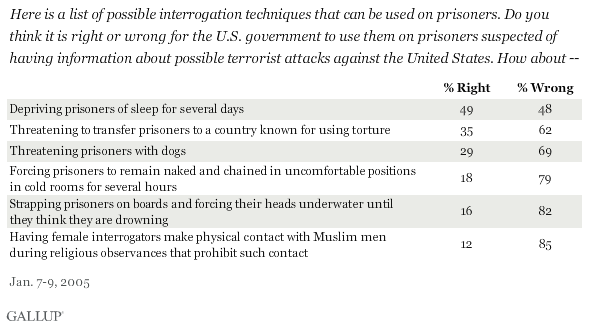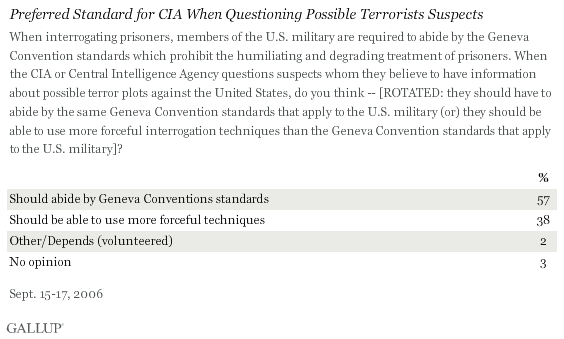The U.S. Senate Select Committee on Intelligence released a consequential report Tuesday detailing the brutal nature of CIA anti-terrorism programs in the years after the Sept. 11, 2001, attacks. The 6,000-page report, authored by the outgoing Democratic majority on the committee, may be the most significant congressional investigation in the modern political era; its conclusions -- that U.S. agents committed acts tantamount to torture on terrorism suspects -- may also shock American sensibilities.
Or not. Indeed, the debate about torture, including "enhanced interrogation techniques" -- which many equate to torture -- has been ongoing in the U.S. essentially throughout the post-9/11 period. Gallup began asking if Americans were willing to allow torture of "known terrorists if they know details about future attacks in the U.S." in October 2001, when 53% of Americans -- still reeling from the horrific attacks visited upon the nation -- said they would not be willing to allow such tactics.
By 2005, the question and utility of harsh interrogation techniques figured promptly in American media and culture. Shows such as 24 featured torture as a "main thread of the plot," as the New York Times described it in May 2005. Meanwhile, several media outlets, including 60 Minutes II and The New Yorker, had published reports of alleged abuses committed at the American-run Iraqi prison Abu Ghraib. These undoubtedly contributed to the wide sense among Americans that U.S. troops or government officials had practiced techniques that were comparable to torture. In a November 2005 Gallup poll, fully three-quarters of Americans said they believed U.S. troops and government officials had tortured prisoners in Iraq and other countries. Meanwhile, a majority (56%) continued to say they would not be willing to have the U.S. government torture suspected terrorists who had information about future attacks. Fewer than four in 10 (38%) said they would be willing to allow such practices.


Earlier that year, Gallup also asked whether it was "right" or "wrong" to employ certain discomforting interrogation techniques on terrorism suspects -- some of which the Senate report now accuses the CIA of perpetrating. Support was low for almost all of the tactics; only "depriving prisoners of sleep for several days" -- a tactic that the CIA reportedly used -- garnered nearly majority support, with 49% saying it was right.

Notably, fewer than one in five Americans said it was right to strap prisoners on boards and force their heads underwater until they think they are drowning (16%), a maneuver better known as waterboarding. It is now known that at least three prisoners were subjected to this treatment, and the Senate report takes the CIA to task for not just the alleged inhumanity of this tactic (a judgment that, at least in 2005, many Americans appeared to agree with), but its effectiveness -- or lack thereof -- in obtaining factual information. For their part, many CIA officials and George W. Bush administration officials contend these practices not only gained valuable intelligence, but were the reason the U.S. was eventually able to locate and kill 9/11 mastermind Osama bin Laden (the Senate report denies this).
Interestingly, the technique that received the lowest level of American approval was one that lacks the element of physical intimidation: allowing female interrogators to make contact with Muslim men in contradiction with religious custom.
A new chapter began in the debate over torture with the Washington Post's bombshell report that the CIA had been hiding and interrogating terrorism suspects in secret prisons, known as "black sites," located in parts of Eastern Europe, Thailand and Afghanistan. In September 2006, Gallup found that nearly six in 10 Americans preferred that the CIA "abide by Geneva Conventions standards" when questioning a terrorist suspect, which probably seemed unlikely to many Americans once they found out about the remote, clandestine nature of these prisons. And the Senate report now plainly states the CIA did not follow these standards. Fewer than four in 10 (38%) in the 2006 poll favored the use of "more forceful techniques."

But by the end of the Bush presidency, concerns with torture showed signs of easing, even as President Barack Obama began his tenure by delivering on his campaign promise to ban the use of torture in CIA interrogations. For one thing, support for a government investigation into "the use of harsh interrogation techniques of terrorism suspects" in 2009 -- the same year the Senate Intelligence Committee began this inquiry that would take nearly six years to complete -- was tepid. A slim majority (51%) of U.S. adults favored such an investigation.
While a majority, that percentage was low relative to the demand for investigations into other scandals or controversial topics of the day that are now largely forgotten. Compare the 51% supporting a government investigation into harsh interrogation techniques with the proportion of Americans favoring investigations into the firing of eight U.S. attorneys that occurred in the Bush years (72%), oil company profits (82%) and the government's response to Hurricane Katrina (70%).
And even as the Senate investigation was beginning, the bulk of Americans were already satisfied that the use of harsh interrogation techniques for terrorism suspects was justified (55%), rather than not justified (36%). This may mean there will not be a lot of national anguish after the release of the Senate report. Meanwhile, other polling firms, such as Pew Research, found as recently as August 2011 that a higher percentage of Americans said the use of torture to gain important information from suspected terrorists could be often or sometimes justified than said it was rarely or never justified.
Lastly, insomuch as Americans wanted an investigation into the use of harsh interrogation techniques, Congress was not their preferred arbitrator. In 2009, Gallup reported a quarter of Americans wanted a bipartisan commission for this duty, while another 22% preferred the Justice Department. Fewer than one in 10 opted for Congress (8%), though the plurality of Americans had no preference.
These data point to conflicting narratives. Americans, even in the peak "War on Terror" years, consistently opposed the use of torture in interrogations. But as of 2009, Americans looked increasingly ready to leave this chapter of their history behind, and believed whatever sins might have been committed were for good reason.
These differing interpretations make it hard to predict how Americans will receive the Senate Intelligence Committee report. And many Americans may focus not so much on the message, but the messenger: few Americans wanted Congress to handle this investigation in the first place; and the fact that the report was released solely by the (outgoing) Democratic majority, rather than the plenary committee, may further discredit its conclusions in some Americans' eyes.
Regardless, this report is certain to continue the nation's long debate about torture.

